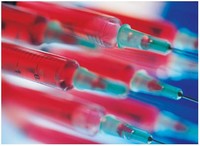HIV Vaccine Shows Results
Researchers says, a vaccine to prevent HIV infection has shown modest results for the first time.

"Before this study, it was thought vaccine for HIV is not possible," Col. Jerome Kim, who is the HIV vaccines product manager for the U.S. Army, told CNN.
Kim emphasized that the level of efficacy was modest, but given the failures of previous HIV vaccine trials, "yesterday we would have thought an HIV vaccine wasn't possible."
He called the results from the trial an important first step that will help researchers work toward a more effective vaccine.
It was also reported, a U.S.-funded study involving more than 16,000 volunteers in Thailand found that a combination of ALVAC and AIDSVAX, from VaxGen Inc., of South San Francisco, cut infections by 31.2 percent in the people who received it compared with those on a placebo, scientists said today in Bangkok. Neither vaccine had stopped the virus that causes AIDS when tested separately in previous studies.
The finding represents a revival in a campaign that appeared to stall just two years ago when use of Merck & Co’s experimental Ad5 vaccine boosted some people’s chances of infection in a study. The latest result will transform future research, said director of the New York-based AIDS Vaccine Advocacy Coalition.
News agencies also report, about 33 million people around the world have HIV and a vaccine would have a huge impact especially in areas where the infection is endemic, such as sub-Saharan Africa.
But HIV appears to be remarkably good at fooling the immune system hence the failure to produce a vaccine that can protect against the disease.
The latest study offers renewed optimism for HIV vaccine researchers after years of depressing findings.
Scientists are cautiously hopeful that it will be possible to build on the positive results to boost the chance of eventual success.
Dr Boasso said the findings were a "breath of fresh air".
Subscribe to Pravda.Ru Telegram channel, Facebook, RSS!


